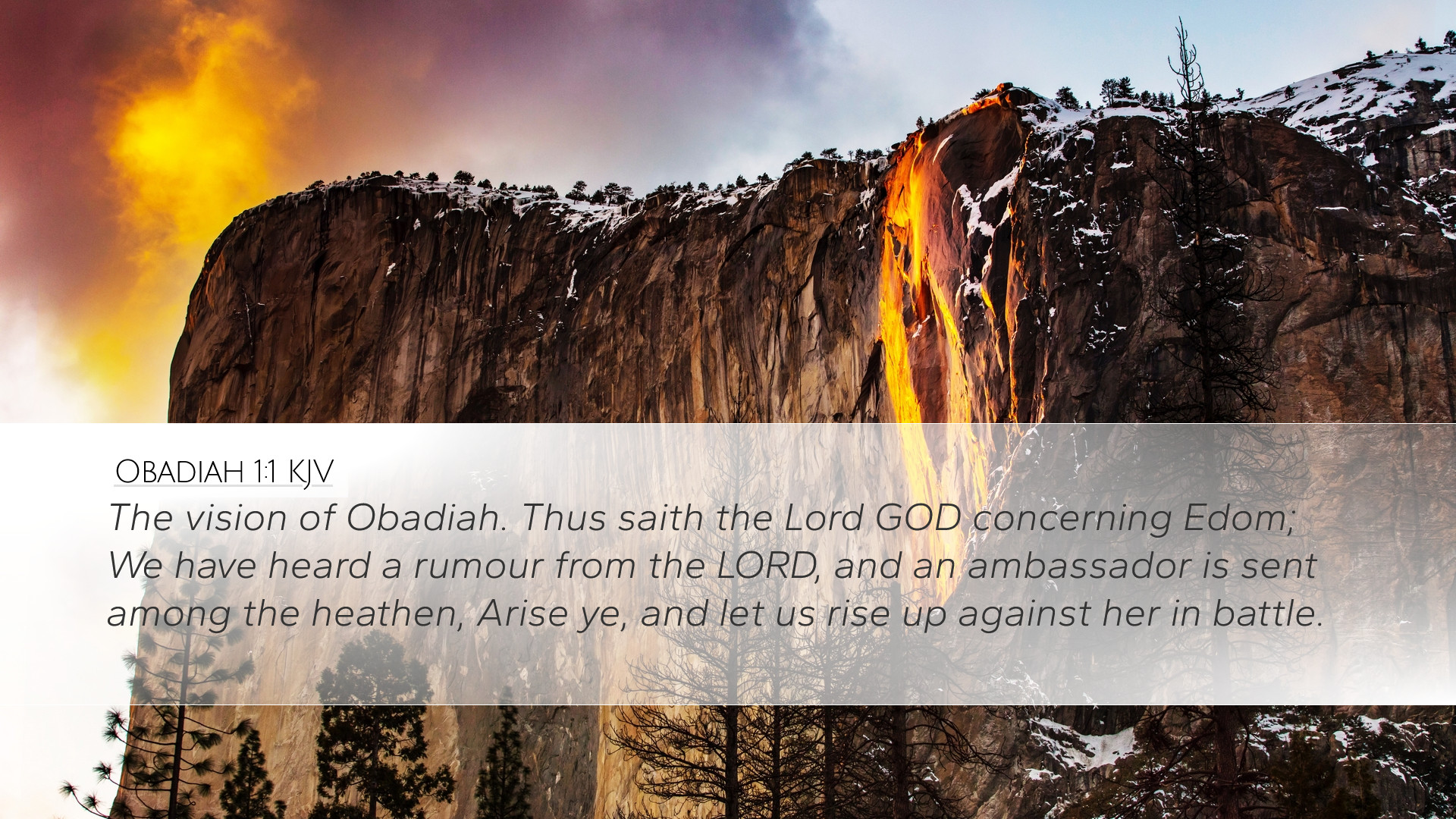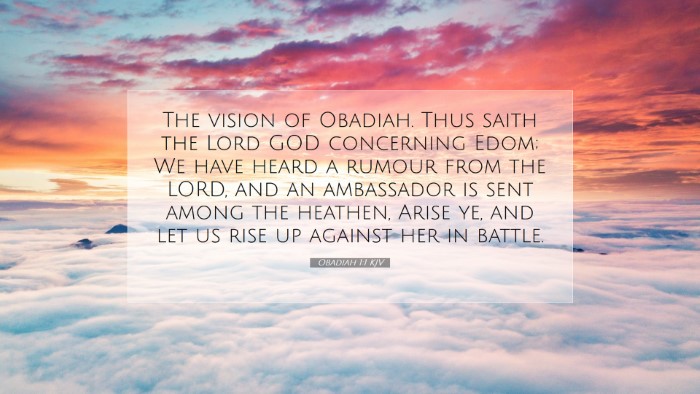Commentary on Obadiah 1:1
Introduction
The Book of Obadiah is the shortest book in the Old Testament, consisting of only one chapter, but it carries profound theological implications and historical significance. Obadiah addresses the themes of judgment, pride, and restoration, particularly concerning the Edomites and their relationship to Israel. This commentary synthesizes insights from notable public domain sources: Matthew Henry, Albert Barnes, and Adam Clarke, to provide a comprehensive examination of Obadiah 1:1.
Text of Obadiah 1:1
The verse reads:
"The vision of Obadiah. Thus says the Lord God concerning Edom—We have heard a report from the Lord, and an ambassador has been sent among the nations: 'Arise, and let us rise up against her for battle!'"
Exegesis of Obadiah 1:1
Authorship and Historical Context
Obadiah, a prophet of the Lord, is traditionally believed to have lived during the time when Jerusalem was besieged and overtaken by the Babylonians. This historic context is crucial for understanding the severity of the message he delivers regarding Edom.
Significance of the Vision
In this opening verse, the phrase "The vision of Obadiah" indicates that this prophetic message comes as a revelation from God, highlighting the divine origin of his message. Both Matthew Henry and Adam Clarke emphasize the significance of prophetic visions, seeing them as pivotal revelations that shape the course of nations.
Prophetic Announcement Against Edom
Obadiah's vision focuses on Edom, Israel’s historical adversary, born out of a lineage stemming from Esau, the brother of Jacob (Israel). Clarke notes that the animosity between the two nations finds its roots in personal family conflict, emphasizing that God’s judgment upon Edom reflects both political enmity and spiritual rebellion.
The Role of the Report
The verse mentions "a report from the Lord" which signifies the announcement of impending judgment. This report underscores God's sovereignty as He communicates His plans to His people by calling them to witness the unfolding of historical events. Barnes elaborates on how this 'report' serves to mobilize nations against Edom, thus invoking a collective response to God's judgment.
Theological Themes
1. Divine Justice
The overarching theme in Obadiah 1:1 is the justice of God. The Edomites, known for their pride and betrayal against Israel during times of distress, are now summoned to face the consequences of their actions. Henry notes that God’s judgments are often realized through the actions of other nations, exemplifying His control over global affairs.
2. The Responsibility of Nations
The call to action among the nations indicates a theological principle regarding communal responsibility. Nations are not merely passive entities but are accountable to God for their dealings, especially regarding how they treat the people of God. Barnes asserts that God provides warnings and testimonies to the nations, urging them toward justice.
3. The Theme of Restoration
While the focus is on judgment, the acknowledgment of a divine report suggests hope for Israel. Obadiah serves as a reminder that God ultimately restores His covenant people, despite their current circumstances. Clarke emphasizes that prophetic messages often contain dual aspects of judgment followed by restoration for the faithful remnant.
Practical Applications
For pastors and theologians, Obadiah 1:1 serves as a rich source of reflection on the nature of God’s justice, the seriousness of pride, and His commitment to justice on behalf of His people. Here are some applications drawn from the verse:
- The Call to Humility: The Edomites’ pride led to their downfall. Leaders and congregants should cultivate humility, acknowledging that all nations and peoples are ultimately accountable to God.
- God’s Sovereignty: Understanding that God orchestrates history reminds believers of His control and presence in tumultuous times. This can be a source of comfort and encouragement in preaching and teaching.
- Calling for Righteousness: Just as the nations were called to rise against injustice, the Church is called to stand against oppression and injustice today, reflecting God's righteousness in both individual and collective actions.
Conclusion
In conclusion, Obadiah 1:1 lays the groundwork for understanding God’s judgment against Edom while simultaneously framing a message of hope for Israel. Through insights from Henry, Barnes, and Clarke, this commentary reveals the multifaceted themes of justice, pride, and restoration, making it applicable for believers today. It serves as a reminder that God's prophecy, while corrective, also carries the promise of renewed hope for those who are faithful and humble before Him.


